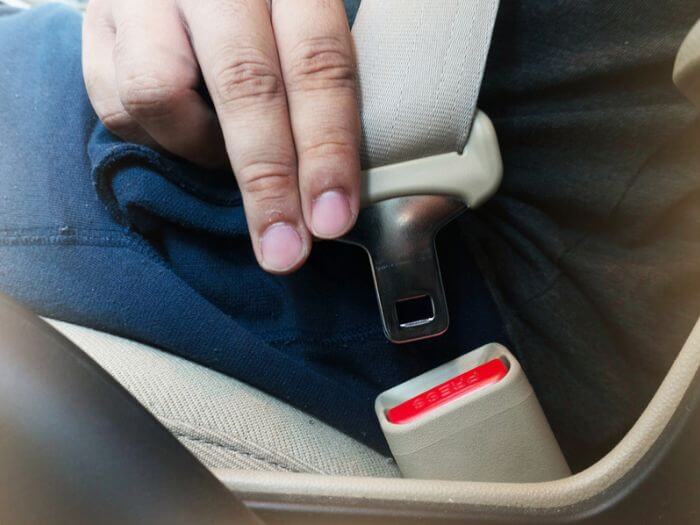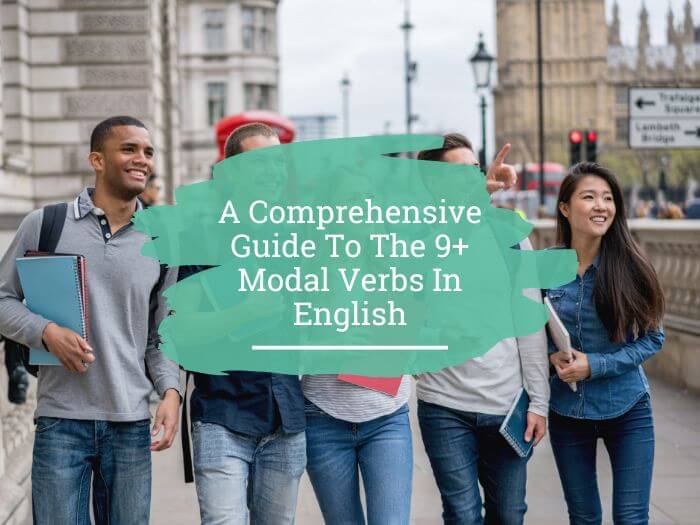You can learn English. But if you want to learn it fluently, you must know your modal verbs. I just used two there – “can” and “must”. But there are 9 modal verbs (and 4 semi-modal verbs) in English to master.
Learning how to use these modal verbs in English is crucial because they are super common and have the power to change the meaning of sentences. This will help you express your thoughts with more precision.
There are several modal verbs and there are also semi-modal verbs. In this post, I’m going to tell you everything you need to know about them.
Table of Contents
What Are Modal Verbs In English?
Will, would, can, could, may, might, must, should, shall – these are all English modal verbs. They are auxiliary verbs that express modalities.
To keep things simple, they are verbs that we need to express necessity, possibility, probability, obligation, ability, permission, and other modalities.
Here are some quick example sentences for you which all contain modal verbs:
- They will call you as soon as I arrive.
- I would go if I were you.
- He can swim very fast.
- I could see the stars from my window last night.
- You may leave the room if you wish.
- It might rain later today.
- You must wear a helmet when riding a bicycle.
- She should try to eat healthier food.
- We shall overcome these challenges together.
Here’s a table that summarises the affirmative, negative and question form of each verb.
| Modal Verb | Affirmative Form | Negative Form | Question |
| CAN | I can swim | I can’t / cannot swim. | Can you swim? |
| COULD | She could be there. | She couldn’t be there. | Could she be there? |
| MAY | I may go. | I may not go. | May I go? |
| MIGHT | They might like you. | They might not / mightn’t like you. | Might they like you? |
| SHOULD | He should tell you. | He shouldn’t tell you. | Should he tell you? |
| MUST | You must see that. | You mustn’t see that. | Must you see that? |
| WILL | It will be okay. | It won’t be okay. | Will it be okay? |
| WOULD | They would do it. | They wouldn’t do it. | Would they do it? |
| SHALL | I shall see you tomorrow. | I shan’t see you tomorrow. | Shall I see you tomorrow? |
As you can see, modal verbs don't change form, so you’ll never find a modal verb ending in -s, -ing, or -ed. You may have also noticed that:

- They are always followed by a base form of another verb (e.g. I can swim, NOT *I can to swim).
- The negative is formed by adding not (e.g. I can not swim, NOT *I don’t can to swim).
- The question is formed by inverting the subject and the verb (e.g. May I help you? NOT *Do I may help you?)
- They are never preceded by auxiliary verbs like do, have, or be.
Let’s now examine each of them individually to see how they work.
Modal Verbs English In Action
1. Can
“Can” is one of the most versatile and commonly used modal verbs in English. It’s used to express ability, possibility, and permission. Have a look at these examples.
Can For Ability
- I can speak three languages. (=I’m able to speak three languages)
- She can sing very well.
- Can he cook great food?
Can For Possibility
- It can get very cold in the desert at night. (=It is possible that it gets cold).
- You can find some great deals if you shop during the sales season.
- There can be heavy traffic on the highways during holiday weekends.

We can also use “can” to question possibility. Here’s an example:
- “Well, how can you learn English if don't practise it?” (=I don’t think it’s possible that you are learning English because you never practise it)
We can also use “can” to express strong negative possibility.
Example:
- John: “Have you heard the news? Jenny and Mark have broken up!”
- Mary: “No way! That can’t be true!”
Can For Permission And Requests
You can use “can” to ask for, give, or deny permission.
- Can I use your laptop for a moment? (=Is it okay if I use your laptop?)
- You cannot park here. (=You’re not allowed to park here)
- Sure, you can use my car tonight if you need it. (= I give you permission to use my car tonight)
Note: the negative of “can” is “can’t” (a contraction) or “cannot.”
2. Could
“Could” is the past tense form of “can,” but we can also use it to express possibility, past ability, or make polite requests.
Could For Past Ability

- When I was younger, I could run a mile in six minutes.
- When I was a kid, I could climb the tallest trees in our neighbourhood.
- I could solve complex math problems in no time when I was in high school.
Could For Possibility
- It could rain later, so bring an umbrella just in case.
- You could try the new seafood restaurant; I've heard it's excellent.
- Given her recent performances, she could be the one to win the championship this year.
Could For Polite Requests
“Could” is normally more formal than “can” when we use it for requests.
- Could you please help me with this?
- Could I see your driving licence, please?
- Could you please give me more information?
Could For Past Possibility
Sometimes we need to talk about something we think is possible, but in the past. In this case, we use could + have + past participle. Like this:
- She could have won the race if she hadn't injured her ankle.
- I could have become a great chef if I had listened to my dad’s advice.
- I could have finished the project on time, but I underestimated how long it would take.

3. & 4. May & Might
Both “may” and “might” can be used to express weak possibility, ask for permission, or make polite requests. Is there a difference between the two? There is. In 101 Grammar Questions, Scott Thornbury, an English teacher and linguist, says:
If two grammar items are interchangeable, and occur in the same contexts, chances are that one of them will become ‘extinct’. Which is not the case with may and might.
Scott Thornbury, 101 Grammar Questions
Let’s clarify things a little.
In most cases, “may” and “might” are interchangeable, so you can use one or the other without any significant difference in meaning.
Here are some examples of when this is the case.
May And Might For Weak Possibility
- It may / might rain tomorrow.
- She may / might be very tired, that’s why she doesn’t want to come over tonight.
- I may / might be able to tell you a bit more about it soon.
No real difference here.
The same is true when we use “may” / “might” for permission and requests.
May And Might For Requests
- May / might I leave the room for a moment?
- May / might I ask a question about the procedure?
- Ladies and gentlemen, may / might I have your attention, please?
Okay, some say that “may” is more formal than “might,” while “might” is more neutral. However, some argue the opposite! In my experience, when making a polite, formal request, people often use “may,” not “might.”
But the real main differences are the following:
- For unreal conditions, we use “might.”
Example: If I had more money, I might buy a new house.
- For questions about probability, we use “might.”
Example: Might it get cold at night? (=Is it possible that it’ll get cold?)
- When you give or deny permission, use “may.”
Example:
- You may leave now. (=You’re allowed to leave now)
- You may not eat food in the room.
- You may start writing now.
- When you need to express wishes and hopes, use “may.”
Example: May the force be with you!
Note: The negative form of “may” is “may not” (not mayn’t). The negative form of “might” can be “might not” or “mightn’t”.
5. Should
You should know about this! “Should” is a super common English modal verb that we use to express advice, expectation, or obligation.
Should For Advice And Suggestions

- You should drink plenty of water every day to stay hydrated. (I advise you to drink plenty of water)
- You should check the weather forecast before going hiking tomorrow.
- She should consider updating her resume to include her latest experiences.
We can also use it to talk about what we think is ideal.
- There should be more parks in this town. (=I think having more parks would be ideal)
- The government should lower taxes.
- More people should go vegan.
We can also use it to talk about past ideal situations, actions or events. In this case, we use should + have + past participle.
Some examples:
- You should have been more careful!
- They should have called before going there.
- He should have paid more attention while he was driving.
Should For Expectations

- The train should arrive by 5 pm. (=I expect the train to arrive by 5 pm)
- The package should be delivered by tomorrow morning.
- The meeting should last about two hours.
Sometimes we use “should” in second conditional sentences (hypothetical conditional). This is, however, a formal way to express condition. (For more on conditionals, check out my guide to the English conditional tense).
Some examples:
- If you should see the president, tell him to call me, please.
- If you should have any questions, please notify us by the end of the week.
- If you should wish to use the suite, feel free to use the interphone to let us know.
In these cases, we often use “should you” instead of “if you should”.
- Should you see the president, tell him to call me, please.
- Should you have any questions, please notify us by the end of the week.
- Should you wish to use the suite, feel free to use the interphone to let us know.
6. Must
“Must” is another common modal verb in English. We use it to express strong obligation, strong necessity, prohibition, and deduction.
Let’s see it in action.
Must For Strong Obligation And Necessity

- You must wear a seatbelt while driving for your own safety.
- We must finish this project by the deadline to meet our client's expectations.
- Doctors must keep patient information confidential.
If you want to express strong obligation or necessity in the past, don’t use “must” but “had to.”
Here are some examples:
- I had to study late into the night to prepare for the exam.
- She had to leave the party early to catch her flight.
- We had to wear uniforms to school every day.
But what about expressing strong obligation or necessity in the future? In that case, we prefer using “will have to.”
- You’ll have to renew your passport before you can travel internationally.
- She’ll have to submit her thesis by next month to graduate on time.
- I’ll have to wake up early tomorrow to catch the first train to Rome.

What if there’s no obligation or necessity? Should we use “mustn’t”? No, in that case, we use “don’t have to” or “don’t need to”.
- You don't have to bring any food to the party; everything is provided. (=It’s not necessary to bring food).
- She doesn't need to come to the meeting if she's too busy.
- We don't have to wear formal attire to the event; it's quite casual.
You can also use “mustn’t,” but the meaning of the sentence changes completely. Compare these two sentences:
- You don't have to bring any food to the party; everything is provided.
- You mustn’t bring any food to the party; everything is provided.
The first sentence means that bringing food is optional. There's no obligation for you to bring anything because the host has already arranged for all the food.
In contrast, “You mustn’t bring any food to the party; everything is provided” carries a strong prohibition. It means you’re explicitly forbidden from bringing food. The use of “mustn’t” indicates a strict rule or a necessity to avoid doing something.
This is also why we often use “must not” to express prohibition to talk about rules and laws.
Must For Prohibition
You may have seen “must not” in public signs that tell you what you’re not allowed to do. Here are some example sentences:
- You mustn't smoke in this area; it's a smoke-free zone.
- Children mustn't play near the construction site for their own safety.
- Visitors mustn't touch the exhibits in the museum.

Must For Deductions
Let’s first define what a deduction is. The Oxford Dictionary says that a deduction is “the process of using information you have in order to understand a particular situation or to find the answer to a problem”.
Let’s say you’re playing a pub quiz game and one of the questions is:
“How many people live in Australia?”
- 10 million
- Around 25 million
- Over 70 million
You don't know the exact number, but you remember reading that Australia's population is smaller than the Italian one, which counts around 65 million people.
So you say, “It must be B, around 25 million.” (=you’re making a deduction based on what you know)
Here are some other example sentences:
- The library is completely silent. Everyone inside must be focusing on their studies.
- She knows all the answers in class. She must study a lot at home.
- He’s so young. He must be in his 20s.
Do you need to make a deduction in the past? Easy: use must + have + past participle. Like this:

- The streets are wet this morning. It must have rained last night.
- The vase is broken. The cat must have knocked it over.
- They knew everything about us. They must have done their research.
7. Will
How often have you seen this verb? Probably millions of times. We often use it to form the English future tense but we also use it for requests, invitations, commands, disapproval, and habitual events.
Will For Invitations And Requests
You can use “will” to invite someone to do something or make requests:
- Will you join us for dinner tonight?
- Will you help me move this weekend?
- Will you please turn down the music?
Will For Orders
“Will” is sometimes used to give orders:
- Will you stop it, please!
- Will you please sit down!
- Will you put that away immediately!
Will For General Truth
We use “will” to talk about something we think is generally true:
- It will always be hard to learn a language without reading or listening.
- Some people will never learn what it means to be poor.
- Italy will always be a beautiful country.
Will For Habitual Actions

We use will to refer to actions and behavior that happen often:
Every time we go camping, Jack will insist on setting up the tent by himself. He‘ll struggle with the poles for a while and then he‘ll get frustrated. Eventually, he‘ll ask for help, but only after he's tried every possible way to do it alone. It's the same routine every trip.
When we talk about repeated behaviour we dislike, we often use “will” too. Here’s an example:
- She will take my books without asking. It really annoys me!
8. Would
“Would” is the past form of “will.” But we don’t use it only to talk about the past; we also use it to make polite requests, soften what we say, and make us sound less direct.
Let’s have a look at the uses of would.
Would For Past Actions And Events
We use “would” to talk about actions and events we happened habitually in the past. Here’s an example paragraph:
Every summer, we would spend a month at my grandparents' house by the lake. In the mornings, my grandfather would take us fishing, and in the evenings, my grandmother would cook the day's catch for dinner. Those were some of the happiest days of my childhood.

IMPORTANT: We don’t use “would” for past habitual states. Instead, we use “used to.” Some examples:
- I used to be a great student in school.
- I used to live in the city back in 2001.
- I used to love horror movies as a teenager.
Would For Polite Requests
This is a very common use of would.
- Would you like some coffee?
- Would you have dinner with me on Friday?
- Would you mind opening the window?
Would For Imaginary Situations
Would is used in second, third and mixed conditional sentences to talk about the result of an event that we imagine.
- If I had a million dollars, I would travel around the world.
- If he had come earlier, we wouldn’t be in this situation now.
- If she had studied harder, she would have passed the exam.
Would For Future Events In The Past
We use “would” to talk about the future in the past:
- When I was 13, I thought that in years to come I would be really rich.
- When she divorced, she was sure she would never find love anymore.
- When they moved to the city, they believed they would eventually return to their hometown.

Would For Wishes
We often use “would” to say what we want to happen. In this case, the structure that we use is “wish (that) somebody/something would do something.”
- I wish you'd stop leaving your things all over the house.
- I wish you'd come visit me this weekend.
- I wish you'd consider my feelings before making decisions.
Would For Uncertain Opinions
There are times when we want to give opinions but we’re not certain about them. In those instances, we use “would” to sound less direct:
- I'd say he was about fifty.
- I would think that the restaurant is quite expensive given its location.
- I'd guess she's probably already left for the day.
Would For Advice
This use of “would” is quite common:
- I would suggest trying the new software update to fix the issue.
- I would recommend booking your flights early to get the best deals.
- I wouldn’t go if I were you.
9. Shall
“Shall” is most used in British English but it’s becoming old-fashioned. It’s still a modal verb so I shall include it in this post. See what I did there?
Shall For Predictions
Although we almost always prefer “will,” “shall” can be used to make predictions (only with “I” and “we” as the subject of the sentence)
Example:
- I shall be in the US next month.
Shall For Advice, Offers And Requests
“Shall” is used in questions with “I” and “we” for making offers or suggestions or asking for advice.

- Shall I open the window?
- Shall we go out for dinner tonight?
- What shall we do about the situation?
The 4 Semi-Modal Verbs
I’ve been talking about modal verbs but did you know that in English there are also semi-modals? These are verbs that sometimes act like English modal verbs while other times are like many other verbs.
The semi-modals are:
- Used to
- Ought to
- Need
- Dare
Here’s a table to show you how they’re formed.
| Semi-Modal Verb | Affirmative Form | Negative Form | Question |
| USED TO | I used to be a doctor. | I didn’t use to be a doctor. | Did you use to be a doctor? |
| OUGHT TO | She ought to tell you. | She ought not to tell you. | Ought she to tell you? |
| NEED | You need only ask. | You needn’t worry. | Need you have worried so much? |
| DARE | I dare you. | You daren’t do it. | Daren’t you? |
Let’s have a look at them individually.
Used To
We use “used to” to say that something happened continuously or frequently during a period in the past.
Here are some examples:

- When I was a child, I used to go fishing with my grandfather every summer.
- She used to be a professional athlete before her injury.
- Back in 1990, we used to have a family gathering every weekend.
The negative form is usually “didn’t use to”, but in British English this is quite informal and is not usually used in writing.
A couple of things to note:
- To form questions, use “did” and the base form of “use” followed by “to”. Like this
- Did you use to like rock music when you were a teenager?
- To form negative statements, use “didn’t use to”:
- I didn’t use to smoke.
Ought To
“Ought to” and “should” are similar. “Should,” however, is more common and less formal than “ought to.”
Ought To For Advice
“Ought to” is used to say what is the right thing to do or give advice. It’s similar to “should”. Here are some examples:
- You ought to apologize for what happened.
- He ought to pay more attention in class.
- We ought to save money for our future expenses.
A couple of things to keep in mind:
1. We don’t normally start questions beginning with “ought to”. This is rare and very formal. Instead, we normally start questions with “Do you think…” or “Should”:
Like this:
- “Do you think I ought to apologise?”
- “Should I apologise?”
2. The past of “ought to” is formed by using “ought to have”:
- You ought to have checked the weather before leaving. (But you didn’t)
- She ought to have informed us about her delay.
- They ought to have apologized for their mistake.
Ought To For Expectations
“Ought to” is used to say what you expect or would like to happen.

- The meeting ought to finish by 5 PM.
- He ought to call us once he arrives.
- The repairs ought to be completed by next week.
Dare
“Dare” means to be brave enough to do something. Here are some examples:
- She dared to speak out against injustice.
- He wouldn't dare question the decision.
- Do you dare to take the challenge?
The negative form is made by using “do” but it can also be made without it (that’s why “dare” is a semi-modal verb):
- She didn't dare to ask for a raise.
- He daren’t confront his boss.
- They don't dare to go out at night.
The same is true for questions:
- Do you dare to jump from the bridge?
- Dare she express her true feelings?
- Does he dare to disagree with the committee?

Need
We use the negative form of “need” as a semi-modal to show no obligation.
- You needn't worry about the details because everything is taken care of.
- She needn't buy a new dress for the occasion.
- They needn't come to the meeting if they're too busy.
If you want to express no obligation in the past, use “didn’t need to”
- You didn't need to worry about the details because everything was taken care of.
- She didn't need to buy a new dress for the occasion.
- They didn't need to come to the meeting if they were too busy.
Mastering Modal Verbs English
So, here you are! You've reached the end of another grammar guide. I hope you found it useful!
You have seen many examples of English (semi-) modal verbs. What’s the best thing to do now to learn them?
A great way to do that is to try to notice modal verbs in English while watching a movie in English, listening to music, reading books in English (or English magazines or blogs in English), or conversing in English.
This is how you will reinforce and consolidate everything you have learned in this grammar guide. Learn them in context.
And why not use the StoryLearning method to master those modal verbs too?
You’ll meet plenty of modal verbs in engaging short stories in English that will help you learn and assimilate them.
I think that’s something you could, should, and must do!

Olly Richards
Creator of the StoryLearning® Method
Olly Richards is a renowned polyglot and language learning expert with over 15 years of experience teaching millions through his innovative StoryLearning® method. He is the creator of StoryLearning, one of the world's largest language learning blogs with 500,000+ monthly readers.
Olly has authored 30+ language learning books and courses, including the bestselling "Short Stories" series published by Teach Yourself.
When not developing new teaching methods, Richards practices what he preaches—he speaks 8 languages fluently and continues learning new ones through his own methodology.










































